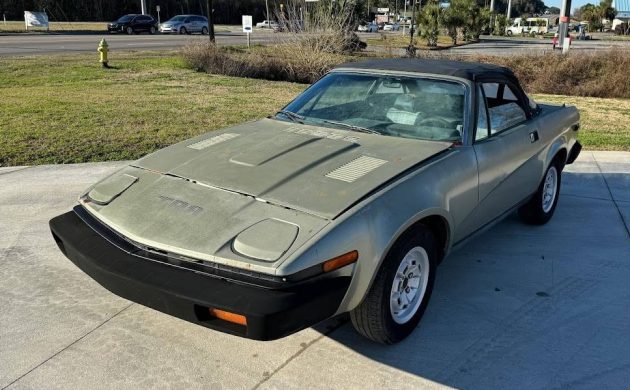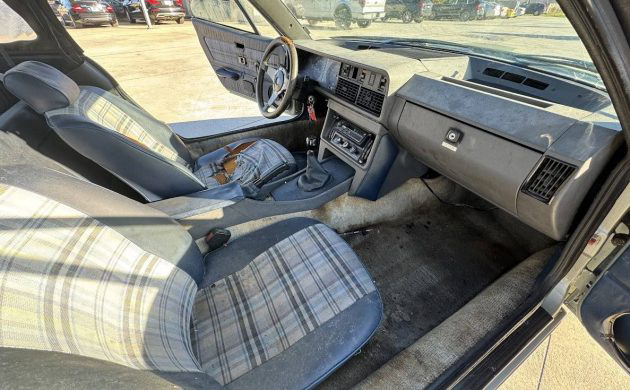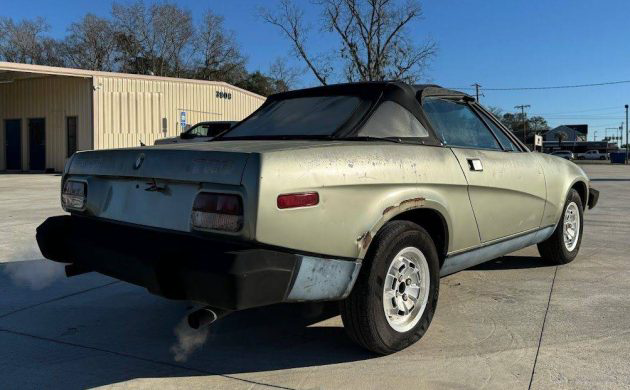
UPDATE 04/05/2024: We’ve recently seen a few classics appear on our desks at Barn Finds where an owner hasn’t tasted success on their first attempt to find their pride and joy a new home. Such is the case with this 1980 Triumph TR8 Convertible. The original listing in February didn’t bring the desired result, with the seller trying again by offering the Triumph here on Craigslist. The details and location remain the same, as does the price of $5,950. The indications are that it could be a relatively straightforward restoration project. I must say a big thank you to Barn Finders Tony P for the original lead and Chuck F for spotting its return to the market.
02/12/2024: It has just occurred to me that “Triumph” is an odd name for a company that managed to snatch defeat from the jaws of victory at critical times in its history. Take the Stag. Great idea, excellent design, came at the right time, but oh, that engine! What a travesty. Or the TR7. Slightly great idea, slightly controversial but trendy 70s design, not quite the right time thanks to vicious rivalries between management and workers, and woeful reliability problems. Another miss. Too late, Triumph put its proverbial nose to the grindstone to fix the 7 – and came up with the TR8. The TR8 story began when the “7” was born: the idea from the beginning was to use a V8 engine. However, the Stag’s engine wasn’t acceptable, and since Rover and Triumph were still sore at each other post-merger, Rover’s perfectly good Buick-derived aluminum block 215ci V8 was also deemed unacceptable. Finally, desperation led to salvation (sort of), and Rover’s V8 was plopped into the 7’s engine bay. By now, production had moved to the more salutary environments of Canley or Solihull, and the newly robust gearbox and rear axles, along with better body construction, transformed the car. Still, only 2800 were sold from 1978-1981, a shame when the model had become so much improved.

This car has a checkered history. It was briefly resurrected with a valve job, new head gaskets, and new suspension, clutch, and steering parts in 2017 after a couple of years of storage. Then, the seller stored it again until 2023. The motor runs well, and the five-speed manual shifts well. The cars were originally built with twin Zenith-Stromberg carbs (California cars got fuel injection); this example has a different setup. The factory rated the engine at about 135 hp. Performance wasn’t scintillating: zero to sixty took 8.5 seconds, making it no faster than the much older TR6! The seller notes that the tires should be replaced.

If you’re going full 1970s (even if the car was made in ’80, it still has that 70s vibe), you might as well opt for tartan plaid seats. Replacement covers and new carpet kits can be had from Rimmer Bros. Some parts, however, will be nearly impossible to find—like sun visors. And beware: The plastic dash is fragile after many years’ worth of heating and cooling.

Aside from the interior’s needs, work awaits outside, too. Rust has settled into a dent over the wheel arch, and the paint has seen better days. On the other hand, the convertible top is reportedly decent and does not leak. The black bumpers look spiffy, too – these tend to fade badly. TR8s are the bargain play on the British field – with V8 power from a respectable engine, a five-speed gearbox, quirky looks, and the top-down option. At this price, I expect this example to find a new home shortly.




“zero to sixty took 8.5 seconds, making it no faster than the much older TR6! ”
The U.S.-spec TR6, which was carbureted and had 104 hp, did 0-60 in 10.7 seconds. The Euro version, which had fuel injection and 150 horsepower, was around 8.2 seconds to 60. So the TR8 was in fact faster than the TR6s sold in the U.S.
True, but I often wondered, with the effects of US anti-smog rules on carbureted engines of this era, why British-Leyland didn’t bring the fuel injected versions of the TR6, TR7 and TR8 stateside? The impacts on both performance and emissions would have been significant. The only reason I can think of is the relatively higher cost of EFI, but the performance gains it offered compared with the choked up carbureted engines of the period would have more than compensated for the price increase, IMHO. BTW, the Germans were leaders in this area of technology, with all of their cars, including the lowly VW Beetle getting Bosch K-Jetronic injection at the time.
I worked at a Jaguar / Triumph dealer on Long Island NY when these were new. They were not popular. We had brand new year-old leftovers rusting in the parking lot. Biuld quality was questionable. They were electronic fuel injected US models..
I remember reading a “Car and Driver” article on these, back in the day. They said the engines in these were,” more suitable for a tractor”.
We didn’t get the factory V8 in Australia but the Leyland 4.4 was a common swap over here, particularly for rally and track use.
Could make a good candidate for LS engine swap and wide body kit( might be a challenge with the deep side body scallop) if that’s your thing – no upside to restoring.
LS, LS, LS, get a new shtick-
There’s always at least one.
These were pretty well received back in the day, and a late 70s Corvette was only about a second quicker to 60. The TR8 was too little too late, the new wave appeal of the Wedge design was fading and the reputation Triumph had was in the tank because of all the problems with the early cars
Too bad, the TR7 was a decent car by the standards of the day, performance comfort and handling to match most all of its competitors. These are still relative bargains and it would probably make sense to spend a little more for a lot better car.
Have a friend who races a ’77 and he has nothing but problems with the engines. Another friend has an ’80 street car that has no problems at all. My only problem with all of them is the bumpers. Designers must have all quit before the series was built and the amateurs took over.
The bumpers were pretty much like most cars of the day.
I had a 1980 TR7 for 3 years. The only issue I had was the transmission fragged on I-5 in Orange County. I didn’t make any friends that day getting off the freeway.
The TR-7/8 are the Rodney Dangerfield of British roadsters.
I think their value has bottomed out and the only place for them is up.
Maybe, but the Jensen-Healeys come into a fair amount of abuse too (and mostly deservedly so…and I say that as someone who keeps an eye for a cheap one to pop up).
As a former TR7 owner. I think $59.50 is a fair price to pay someone to take it to the crusher
As another former TR7 owner – owning one is much like a boat – the two best days of ownership are the day you buy it and the day you sell it – and it rolls out of your driveway to a new owner (usually on the back of a flatbed with you breathing a huge sigh of relief that you only lost that much money during your ownership!)
Another sad thing was the only dealer that would take the tr 7 in a trade sold dodge s So i bought another piece of crap. 83 Shelby charger
its a tr 8 not a 7
So funny! I just used that same saying WRT the vintage RR posting!
bt
Troy, Lynn …. stop already , my stomach is sore from laughing so hard !
Seriously . Thanks so much for that !
I agree with most of what was said in the original post, but to British-Leyland’s credit, they stuck with the 215 aluminum V8 that GM abandoned and sold to Rover for a pittance, and made it work. This one has had an Edelbrock intake manifold added and a four-barrel aftermarket carburetor fitted, to replace the dual Strombergs that it was born with, ending the chore of routine carburetor synchronization. For those so inclined, one could replace the four-barrel fuel mixer with a TBI unit.
The TR8 was both a step forward and a step backwards at the same time, with unibody construction replacing the TR6’s body-on-frame construction, while taking a big step backwards with the solid rear axle holding up the back end of the car in place of the TR6’s IRS setup. The styling is polarizing, but I rather liked it at the time. I consider the TR-6 to be mechanically superior, and nothing beats the sound of a straight six, except, perhaps a V12, LOL! Straight sixes have almost completely disappeared from the automotive landscape, except for the GM Vortec 4200 (LL8), and the MB M256, and even the GM Vortec is seen only in used Chevy Trailblazers and GMC Envoys (2002-12), along with their corporate sisters, and the Saab 9-7X.
Not to worry. The next gen Charger and Challenger that aren’t EVs will come with a twin turbo straight six, in 2025.
That’s good news, because the M-B cars with the straight-six are “lottery cars”! What’s lottery car, I hear you cry? Well, a lottery car is a car you have to hit the lottery to be able to afford it, LOL! I’m hoping that the Stellantis twins will be more affordable than the M-B iron, but given the price of either a Challenger or a Charger these days, I’m not so sure that they haven’t become lottery cars either!
Had a Saab 9-7x (aka Trollblazer) with the 4.2 Atlas (Vortec) straight 6… fantastic engine… rest of the vehicle not so much… Big issue was that they crippled it by having the power go thru the long-in-the-tooth 4L60 tranny… dependable but inefficient.
I’d love to do a replica of a first generation Corvette, with a turbocharged 4.2L Vortec engine bolted to a Tremec six-speed manual gearbox, as a homage to the original “Blue Flame” six cylinder engine that the original Corvettes were born with. Hot rodders have been able to extract over four-hundred (400) horsepower from those Vortec sixes. One guy dropped one into a 1969 Firebird as a tribute to the DeLorean “Sprint” six, and was darned close to getting five-hundred (500) horsepower out of it!
So, in today’s English, is this called a “Trait”?
I’ve always liked the look of these, if you could get the engine sorted out, I think they’d be a lot of fun.
The electrical system was designed by the man that invented darkness
Lucas
LUCAS-
Left
Us
Cold
And
Stranded..
Do you have personal experience to confirm that? Here is my Brit cars/Lucas history: ’60 MG Magnette – zero electrical problems. ’65 Sunbeam Tiger – zero electrical problems. ’80 Triumph TR8 (currently) – as yet insolved non-start problem which appears to be electrical. The car sat stored for almost 13 yrs. now.
Yes I do Joe, though in all fairness the most persistent issues were with electric overdrive on my ‘74 and ‘76(?) Spitfires, tho an occasional issue would rear its ugly head on my ‘64 Bonneville 650 as well..
Have to say there weren’t many issues on my ‘61 Midget (am I even allowed to use that word anymore?) but I think the wire loom on that one was maybe 13 wires altogether!
The arly TR-7 ads tooted, ” the shape of things to come” and they were right, as many 80s cars featured wedge shapes to some degree or another, as aerodynamics were becoming a big thing!
Yes Terry unfortunately I do. The part in the distributor let me sit at at very heavy traffic intersection. Not just electrical problems either. The throttle cable fell off the first time I drove it. The windows came out of the track many times. The floor inspection plate came loose and filled the car with slushy snow. The rear end control arms had no rubber bushings. I could go on. So yes I had first hand experience on these pcs of junk
I always find the TR7/8 story sad… Triumph finally got it right when they put the 8 in there, but the with all the problems that came with the ‘7, they just couldn’t get past the reputation and killed it… GM did the same thing with the Fiero a decade later…
TR8s are complicated cars. One sits in my garage. They are also very much NOT a Sunbeam Tiger – which are a rip to drive.